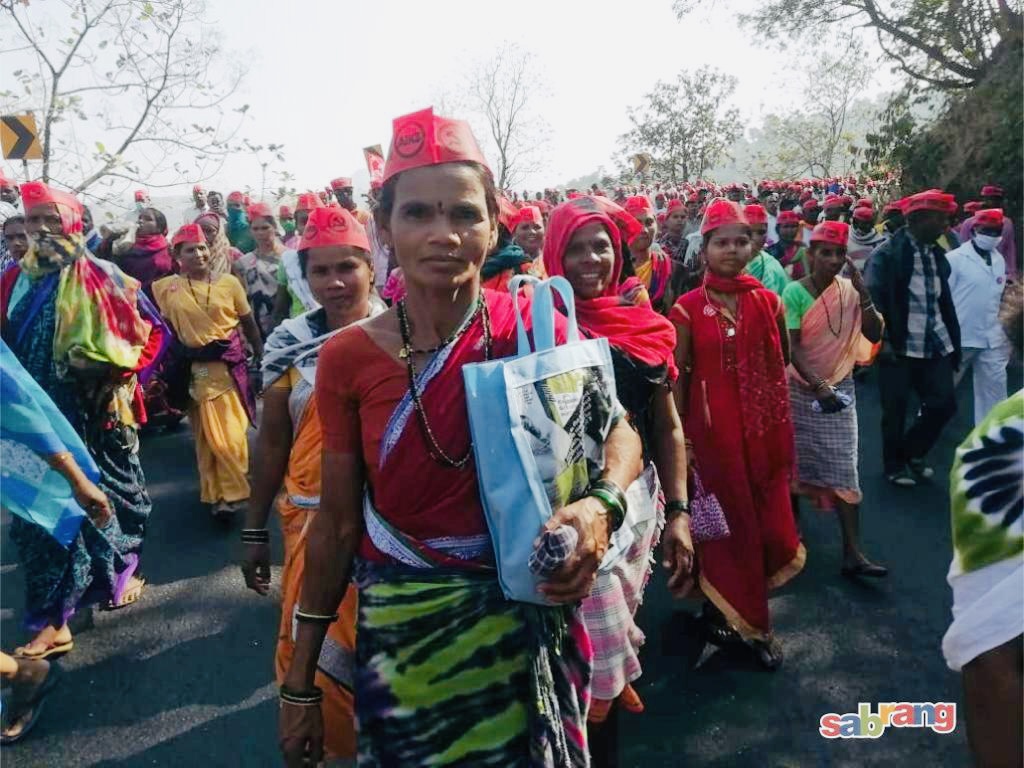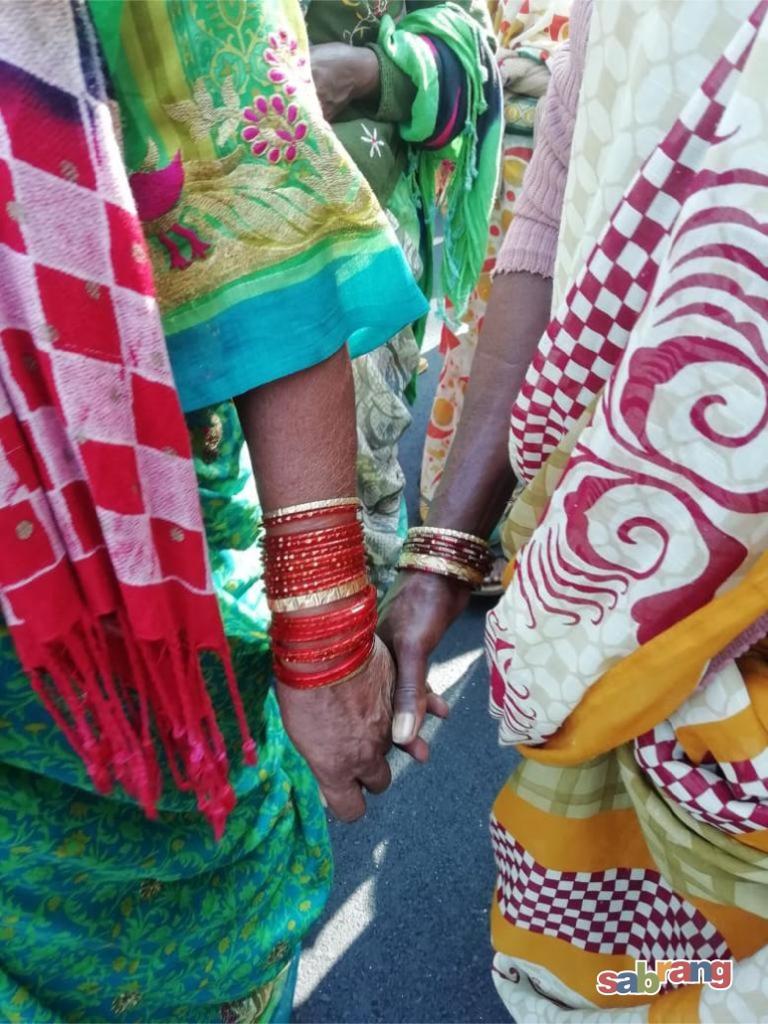Farmers’ Rally: “I have come to Mumbai to get 7/12 of my land.” Tribal farmers from Palghar, Maharashtra demand land titles under the Forest Rights Act
Over 15,000 farmers from across Maharashtra, led by the All India Kisan Sabha, are in Mumbai demanding settlement of their 7/12 land titles, repeal of the three farm laws, a central law on MSP, resumption of loan waiver scheme and repeal of the new labour codes.

Mumbai, Maharashtra
Sumitra Suresh Tumbada, a mother of four, is a farmer belonging to the Warli tribe. Unlike the farmers of Punjab and Haryana, who own large tracts of land and use tractors for farming, Tumbada has five-six acres (2.02 to 2.4 hectares) of land in Dongarwadi village on a hilltop in Jawhar taluka of Palghar, about 130 kilometres north of Mumbai, Maharashtra.
If the monsoon is good, she grows nagli (ragi/finger millet), varai (a local millet), toor (pigeon pea), urad (black gram) and bhaat (paddy) on her land, which the forest department claims is forest land. Her produce is not meant for any market, but only for the consumption by her family. Like Tumbada, a large number of tribal families in Palghar practice sustenance agriculture.
Predictably, these tribal farmers have little to do with the APMCs (agricultural produce market committee), MSP (minimum support price) and the three new farm laws of the central government against which thousands of farmers are protesting in Delhi for the last two months.

But, Tumbada and several other small and marginal tribal farmers from Palghar have come to Mumbai, via Nashik, as part of a farmers’ rally flagged off from Nashik on January 23. They reached Azad Maidan in Mumbai last evening.
They are here to lend support to the protesting farmers in Delhi and also to press for their long-pending demand of settlement of rights to their ancestral lands under the Forest Rights Act, 2006.
“Mine is ancestral land on which my forefathers have been farming for several decades. I grow food on it to feed my four kids. But the forest department claims it is their land and that I am an encroacher,” Tumbada, sitting in the open in Azad Maidan and wrapped in a thin shawl, told Gaon Connection.
“It’s been over a decade since I filed a claim under the Forest Rights Act, but my land is still van patta zameen and I have not got 7/12 [land title] for my land. I have come to Mumbai to get that,” she said.
Shantaram Phadwale, Ramdas Ragho Pagi and many other Warli tribals farmers from Palghar have come to Mumbai to demand right to their land under the 2006 Act.
This isn’t the first time they are part of an andolan (movement) to come to Mumbai and be heard. About three years ago, in March 2018, about 30,000 farmers from across Maharashtra walked over 180 kilometres from Nashik to Mumbai demanding land titles, crop loss compensation and farm loan waiver.
“During the ‘long march’ of 2018, settlement of titles under the Forest Rights Act was one of the demands. We had also demanded crop loan waiver, which was accepted by the government and several farmers benefited from it,” Ajay Burande, who is associated with the Democratic Youth Foundation of India, told Gaon Connection. His organisation has been instrumental in organising the ongoing farmers’ rally in Mumbai.
“Since land titles under the Forest Rights Act have still not been granted, we will continue with our andolan,” he added. He travelled from Beed, a drought-prone district in Marathwada, to Mumbai to be a part of the rally.
Why do tribal families remain ‘encroachers’?
The Scheduled Tribes and Other Traditional Forest Dwellers (Recognition of Forest Rights) Act, 2006, commonly known as the Forest Rights Act (FRA), legally recognises and vests forest rights and occupation in forestlands with scheduled tribes and other traditional forest dwellers who have inhabited and resided in the forests for generations. It also empowers gram sabhas to manage and govern the forestlands.
According to data released by the Union ministry of tribal affairs, which is the nodal ministry for implementation of the 2006 Act, at the national level, 4,253,089 claims (4,103,177 individual and 149,912 community claims) were filed up to August 31, 2020, of which 1,985,911 titles (1,909,528 individual and 76,383 community claims) were distributed.
This comes to 46.69 per cent, or less than half of the applicants being awarded the titles under the FRA. At the same time, as per the ministry’s data, 1,755,705 claims received at the gram sabha level were rejected under the 2006 Act, which comes to an overall rejection rate of 41.28 per cent. This makes those forest dwelling families ‘encroachers’.
Take the case of Maharashtra, where a total of 374,716 claims (362,679 individual and 12,037 community) were filed under the FRA till August 31 last year. Of these, the number of titles distributed were 172,116, which is only 45.9 per cent. Thus, less than half the claims under the FRA have been settled.
Of the 362,679 individual claims filed, only 165,032 claims (45.5 per cent) were settled in the state.

“The question of non-settlement of titles under the Forest Rights Act affects a large chunk of tribal population in Palghar. Despite filing claims, we have not received 7/12 for our land and are regularly troubled by the forest department,” Ramdas Ragho Pagi, a Warli farmer from Jhap village in Jawhar, Palghar, told Gaon Connection. He is in Mumbai to participate in the farmers’ rally.
“I have ten acres [4.04 hectares] land for which I had filed a claim under the FRA. But my claim has been settled for only 31 gunta [one gunta is 1/40th of an acre],” he added.
Shantaram Phadwale of Dongarpada village in Palghar has similar concerns. “The ten-acre [4.04 hectares] land on which I farm belongs to my forefathers. But, the government is not allowing me to till my own ancestral land and calls me an encroacher. I want 7/12 for my land and that is why I have come to Mumbai,” he told Gaon Connection.
Apart from settlement of land rights under the FRA, farmers who have gathered in Mumbai have some more demands: Repeal the three farm laws; enact a central law guaranteeing remunerative MSP (minimum support price) and procurement; withdraw the Electricity Amendment Bill; repeal the four labour codes; and resume the implementation of the Mahatma Phule Loan Waiver Scheme for farmers, which had been suspended due to the COVID-19 pandemic.
The battle for their ancestral land is just one of the many fights the tribal farmers of the state face. “Our village has no paved road. One has to trek to reach there. If someone falls sick, we carry the person in a makeshift stretcher made of bamboo and bed-sheet. The nearest health centre is five kilometres away,” told Pagi.
Meanwhile, every summer, Tumbada has to trek five kilometres every day to fetch water for her family. “By the Holi festival, all the water bodies in and around our village dry up. I have to walk five kilometres, twice a day, to bring water,” she narrated. “We can barely grow kharif crop in a year, as there is no irrigation facility for the rabi crop. The government doesn’t even allow us to grow one crop a year,” she added.
For thousands of tribal families in the state, their fight is for basic survival as sustenance farmers. To be able to respectfully feed their families. And, Palghar, whose farmers are camping in Mumbai, is notorious for malnutrition linked deaths.

